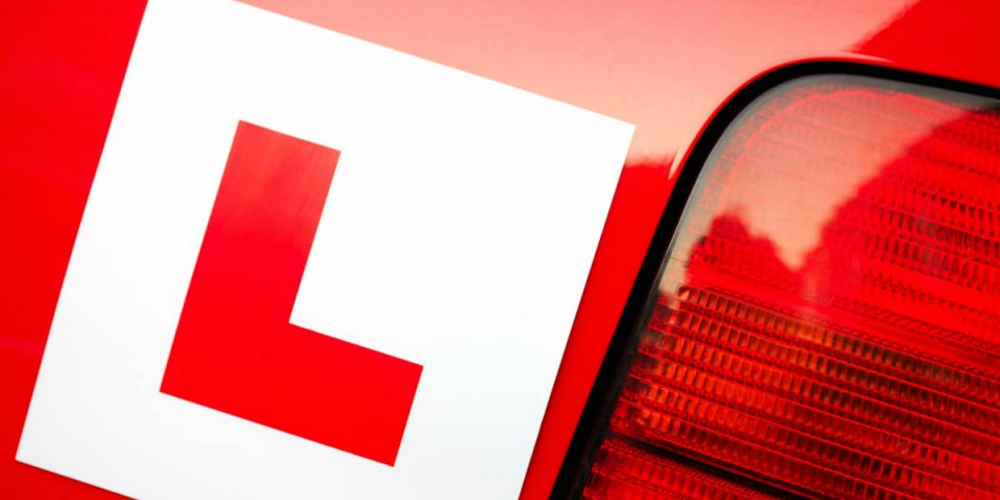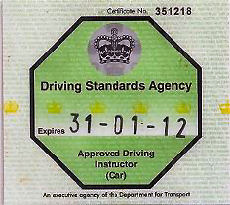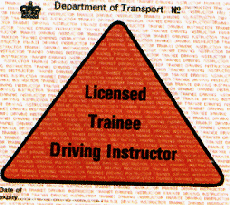
Unless you have the luxury of a lot of open space in an off-road area, your first experience of learning to drive will be on the public road with a driving instructor, a friend or a relative.
 For many young people, learning to drive and being in charge of a motor vehicle will be the biggest responsibility in their lives so far. But with help from a good driving instructor, you will soon be taking it all in your stride.
For many young people, learning to drive and being in charge of a motor vehicle will be the biggest responsibility in their lives so far. But with help from a good driving instructor, you will soon be taking it all in your stride.
Start by taking a few minutes to read this short information lesson - you'll find that it's time well spent.
Whatever your first experiences are, it's essential to build a solid foundation to avoid problems and disappointment later on.
You will be legally liable if anything goes wrong because of your driving or because your vehicle does not comply with the law.
The fact that you are only learning to drive does not mean that you are not responsible - as far as the law is concerned, you must obey all the rules and drive safely.
The question of lesson prices often comes up.
When choosing an instructor, lesson price is only a rough guide to the cost of learning; lots of 'cheap' lessons can be far more costly in the long run than fewer 'expensive' lessons if you don't have an instructor who is right for you.
Also, be aware that some cut-price services sometimes cut corners to save fuel and other costs.
For example, there might be more time spent talking than driving. Talking about things is important, but it shouldn't take up more than 20% of your lesson time - you can learn all the theory about how to drive a car in the DriverActive Online Course.
Low lesson prices also might mean an instructor can't afford to take the training needed to keep them up-to-date with modern accelerated learning methods. At the other end of the scale, expensive lessons don't necessarily guarantee quality. Read the stuff about choosing an instructor in this lesson.
Driving instructors come in all colours, genders, shapes and sizes.
 You no longer have to have an instructor who wears a cardigan and smokes a pipe - in fact, it's illegal for your instructor to smoke in a driving school car!
You no longer have to have an instructor who wears a cardigan and smokes a pipe - in fact, it's illegal for your instructor to smoke in a driving school car!
The information on this page will help you to choose a driving instructor who is the right fit for you.
Modern instructors vary widely, young trendy and sensible through to 'old' caring grandparent-type instructors. The youngest UK instructor qualified at 21 years old, while the oldest is over 80!
Because you will spend quite a lot of money on a full course of lessons – that's anything up to and beyond £1200 - you deserve an instructor who is right for you.
The best way to find any product or service is to get a recommendation from a friend who has had experience. If you know someone else who has had or is having lessons, they might be able to recommend their instructor.
Recommendation is a good start when learning to drive and looking for driving lessons - but don't take it for granted that someone who suited your friend will also suit you.
The chances are that if someone has been recommended to you, they will be great - but be prepared to 'shop around' if you are unsure. If you feel that you are not learning or are not enjoying your lessons, it might be your aptitude for driving - but equally, it could be that your teacher is not the right one for you.
The quickest, cheapest and best way to drive is to find an instructor you get on well with and who inspires you with confidence.
'Try before you buy.' if you are starting from scratch with no recommendation, spend your first £50 or even £100 shopping around. If you are not happy, move on.
Sometimes, if you have a friendly instructor but still feel that they are wrong for you, it can be difficult to pack them up and try someone else. Some people feel guilty doing this. But remember that you are a paying customer. If the service doesn't suit you, find one that does.
Here is a simple test to discover whether an instructor is right for you.
If by the end of a lesson, you feel that you haven't enjoyed the experience or learned little or nothing, the chances are that the instructor is not suitable for you.
Everyone has a bad lesson from time to time, but these should be rare. Consider changing your teacher if you have two or three 'bad lessons' in succession.
Some people learn to drive with friends and relatives, but as roads get busier, it's a good idea for all learners to have some lessons with a qualified, professional instructor.
It is illegal for anyone who is not an Approved or Licensed driving instructor to charge a fee for driving tuition. In addition, the instructor must, by law, display their certificate on the windscreen during lessons.
Approved Driving Instructors (ADIs) have passed an examination to demonstrate their skills. They are also checked and graded regularly.
Fully qualified instructors:
 Fully qualified instructors will display a green certificate on the windscreen - this will have their photo and the dates for which the qualification period is valid.
Fully qualified instructors will display a green certificate on the windscreen - this will have their photo and the dates for which the qualification period is valid.
Instructor grading can be A or B - both are acceptable, but 'A' is a higher standard.
Some instructors get a C grade, meaning they were unsatisfactory on their last assessment and are awaiting a re-assessment. These instructors are under review and risk losing their tuition licences.
Instructors are issued with a certificate which shows their grade; they should be happy to show this to you. If you ask for evidence of the instructor's grade and they refuse to show it - be suspicious!
Some instructors will have further qualifications such as special advanced driving certificates, teaching diplomas and even industry-related degrees.
Generally speaking, better-qualified and experienced instructors will offer better value (although they might charge a bit more).
Licensed instructors display a pink badge in the windscreen.
 Licensed instructors are in the final stages of training and qualification. These instructors have undergone a minimum required training programme but have not yet passed the last part of the qualifying examination. They are gaining practical experience before completing their qualification
Licensed instructors are in the final stages of training and qualification. These instructors have undergone a minimum required training programme but have not yet passed the last part of the qualifying examination. They are gaining practical experience before completing their qualification
While Licensed Instructors are expert drivers and have learned the basic teaching skills, they have fewer than six months of experience in the job.
Although Licensed Instructors lack experience, they are invariably enthusiastic and trained to the latest standards.
Licensed instructors must display a pink certificate on the windscreen - like the qualified instructor certificate, this will have their photo and the dates for which the licence to teach is valid.
If you practise with friends or relatives - go for it!
 The more practise you can get, the sooner you will gain the confidence to pass the test and drive alone.
The more practise you can get, the sooner you will gain the confidence to pass the test and drive alone.
But make sure you follow your driving instructor's advice when practising - remember that driving is not just about passing a test, it's about staying safe and staying alive.
The hard facts are that 1.35 million people are killed on the world's roads every year - 33% of them are under 25 years old.
The person who sits with you when you are driving must:
be over 21 years old, and
have held a driving licence for at least three years
These are legal requirements.
We mentioned 'responsibility' in the introduction to this lesson. The learner and supervisor are responsible for what happens in the car and on the road. Supervisors are subject to the same rules as drivers. They must not use a hand-held phone and be fit in terms of drink and drugs.
To get the best out of your practise, ask your instructor what to practise and where to practise it. All practise is good for you, but it's easy to get a false sense of confidence if you only drive on open roads and at higher speeds.
Although you will learn quicker if you get more practice, we do have a word of warning. When practising with friends or relatives, remember that they have the experience. Listen to their advice and act on it.
If the advice given by your supervisor differs from your instructor's, find out why. Get them to talk to your instructor about modern and efficient driving methods.
Some instructors run sessions for supervisors. They offer advice and tips to help keep your practise sessions productive and stress-free. Alternatively, you might be able to arrange for your supervisor to sit in on a driving lesson and ask awkward questions - they might learn something! If your driving instructor thinks that this is a bad idea, find another one with a more enlightened approach.
 Make sure that you have a Provisional Driving Licence, that any car you drive is taxed, MOT tested, clearly displays L plates and is insured for you to drive as a Provisional Licence holder.
Make sure that you have a Provisional Driving Licence, that any car you drive is taxed, MOT tested, clearly displays L plates and is insured for you to drive as a Provisional Licence holder.
If these things are not 100% OK, you could lose your licence before you pass the test!
You must be in physical possession of your licence before you take lessons or start driving - simply applying for your licence is not enough. Be patient! If you drive before the licence arrives, you could end up with penalty points before you even start proper driving lessons. Your driving supervisor could also face charges.
You must also be able to read a car number plate from a distance of 20 metres.
Remember that you are legally responsible. You don't want to get points on your licence before passing your test.
Apart from the fines, six penalty points within the first two years after passing your test would mean having to start over again and revert to 'learner status'. Before you could drive alone again, you would have to pass another theory test and driving test.